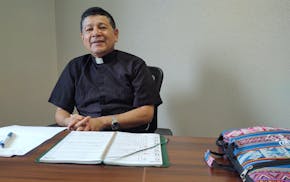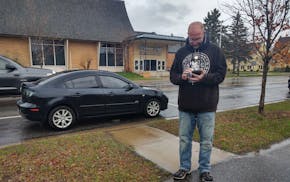FERGUS FALLS, MINN. – Stephen Vigesaa doesn't strike the casual observer as a subversive kind of guy.
The father of three, including two daughters in high school, serves on the Fergus Falls school board. He supports the military. He loves the national anthem. He's a follower of Jesus.
But there's one thing Vigesaa has stopped doing. And that's saying the Pledge of Allegiance.
At every school board meeting, instead of placing his hand on his heart and repeating the words instilled in public school children from the youngest grades, he stands quietly with his arms at his side.
"Ever since I was a kid, I said the Pledge of Allegiance; I kind of felt icky saying it," he said. "Just the words, 'I pledge allegiance to the flag,' like the country's a god. I'm a Christian, a follower of Jesus. To me, it conflicts with my faith."
Vigesaa says being forced to say the pledge is no different than the biblical story of three Hebrew men ordered by King Nebuchadnezzar to kneel before a golden idol.
Sometime around COVID, when people were meeting remotely, he just stopped. And once everyone began meeting in person again, he never started again.
At one point, a pastor who was filming school board meetings posted video of Vigesaa standing there with his hands in his pockets.
"I got some backlash from it," Vigesaa recalled. "I got some direct Facebook messages of you know, 'People died for this country, how dare you not say the Pledge of Allegiance? What's wrong with you?' They've questioned my faith."
He knew those people, but not well. For a time, he changed his Facebook name to make himself harder to find. He decided to stand differently during the school board meetings. Instead of having his hands in his pockets, he clasped them in front or behind. Eventually, another school board member switched spots with him so he wasn't on camera anymore.
Now that he's up for re-election, the old criticisms have revived.
"I would hate for someone be re-elected that doesn't respect the flag," one Fergus Falls woman wrote on Facebook on Sept. 11. "I've watched him on multiple occasions do this" at board meetings.
At a public forum for the nine candidates running for three open spots, candidate Kelli Graff said she would like the schools to return to saying the pledge every day. She didn't mention Vigesaa.
Current Minnesota law says that all public school students should recite the pledge at least once a week, either in each classroom or over the intercom. But it also allows local school boards to waive the requirement, and says that any student or teacher may decline to participate. The U.S. Supreme Court has ruled that it is unconstitutional to require students to say the pledge.
Many countries, including Canada, do not require students to recite a pledge to their country or flag. Though to be fair, Canada wasn't fractured by civil war, unlike the United States. In the wake of that war, accompanied by a surge of immigrants, concerns about loyalty led a popular magazine called The Youth's Companion to publish a pledge that was recited during a Columbus Day celebration in 1892. The text:
I pledge allegiance to my flag and the Republic for which it stands — one Nation indivisible — with liberty and justice for all.
If those words seem different than the ones kids say today, they are. The words were altered to specify that "my flag" referred to the U.S. flag, and "under God" wasn't added until 1954. So when someone refuses to recite the pledge, they're not breaking a tradition that has existed since the country's founding. It's actually fairly new.
Vigesaa is far from alone in his stance. In 1942, Jehovah's Witness children and their parents sued after children were sent home for not saying the pledge, saying it violated their faith, and the U.S. Supreme Court ruled in their favor.
I would hate to see voters punish Vigesaa for his position. It takes moral courage to resist going along with the group, and in my experience, that's a rare quality.
Vigesaa's stance is outweighed by other issues. Fergus Falls has seen several student suicides over the past few years. Mental health care for students has become "as important as food," in Vigesaa's words. Bullying and book bans should take precedence over the pledge.
"I know there are people who feel strongly about it," said Niki Welde, co-president of the Fergus Falls Education Association. "I would hope they would look at the fact that we've got bigger issues."
Vigesaa is OK with the pledge being said in public places. He just wants the freedom not to have to say it himself.
"I'm not on a big crusade," he said.
A previous version of this story gave the wrong year for when "under God" was added to the Pledge of Allegiance. It was 1954.

Tolkkinen: Fergus Falls priest who studied with Pope Leo says he has good hearing 'to hear everyone'

Tolkkinen: Just when I was starting to lose myself in nature's grandeur, along came a motorcycle

Tolkkinen: On a three-day northern Minnesota tour, the grit and glory of our state became clear

Tolkkinen: Brainerd City Council should spend a night, or 30, sleeping outdoors


